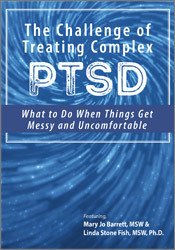

When working with trauma cases do you often see clients go into flight, fight, and/or freeze? Do they yell at you, insult you, or leave the session? Are there times you find yourself angry at your clients or just downright don’t like them? Do you recognize your own flight, fight, and/or freeze response? Welcome to the messy, often confusing world of trauma treatment. In this workshop, you’ll explore practical in-session techniques as well as a framework to help you recognize what’s happening when things heat up and get intense.
| File type | File name | Number of pages | |
|---|---|---|---|
| ZNM049880 (0.89 MB) | 24 Pages | Available after Purchase |
Linda Stone Fish, MSW, PhD., is the David B. Falk Endowed Professor of Marriage and Family Therapy at Syracuse University and the author of Nurturing Queer Youth.
Speaker Disclosures:
Financial: Linda Stone Fish is in private practice. She is a David B. Falk Endowed Professor at Syracuse University.
Non-financial: Linda Stone Fish is a member of the American Family Therapy Association.
Speaker Dislcosures:
Financial: Linda Stone Fish is in private practice. She is a David B. Falk Endowed Professor at Syracuse University. She has no relevant financial relationships with ineligible organizations.
Non-financial: Linda Stone Fish is a member of the American Family Therapy Association.

Mary Jo Barrett, MSW, is the founder and director of the Center for Contextual Change, and the coauthor of Treating Complex Trauma: A Relational Blueprint for Collaboration and Change and Systemic Treatment of Incest.
Speaker Disclosures:
Financial: Mary Jo Barrett is the founder and director of the Center for Contextual Change. She has no relevant financial relationships with ineligible organizations.
Non-financial: Mary Jo Barrett has no relevant non-financial relationship to disclose.
Introduction and overview of collaborative change model for trauma treatment
Experiencing collaborative change therapy with trauma
Concluding remarks and question and answer session
Please wait ...